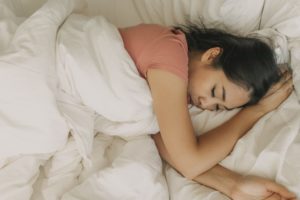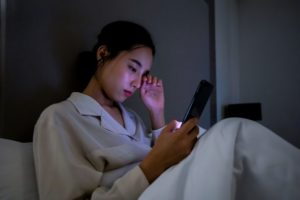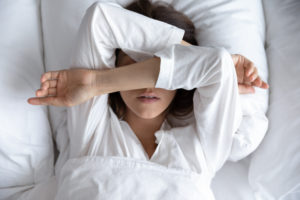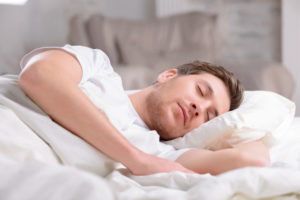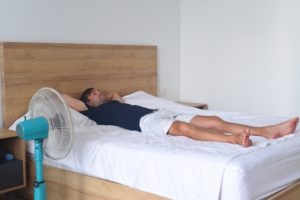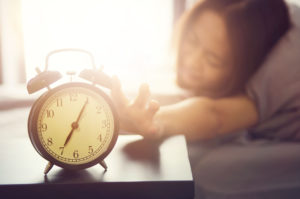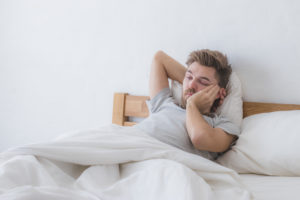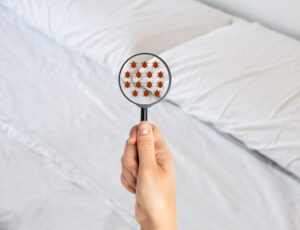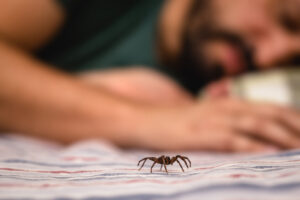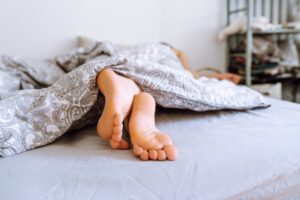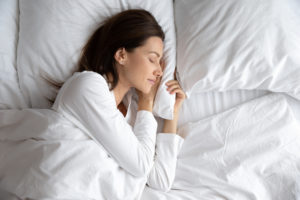When you buy through our links, we may earn a commission. Products or services may be offered by an affiliated entity. Learn more.
How to Pull An All-Nighter
There are many reasons why a person might have to pull an all-nighter, which involves staying up through the night to work, study, or perform another necessary task. While missing a night of sleep is generally not recommended, sometimes it is necessary.
If you are facing a project deadline, an exam, a night shift, or another pressing responsibility, you may be wondering how to stay up all night without falling asleep.
We discuss how to pull an all-nighter, including advice about how to prepare and how to recover afterward. We also examine why all-nighters can be harmful and offer alternatives to avoid sacrificing sleep in the future.
Looking to improve your sleep? Try upgrading your mattress.
How to Stay Up All Night
Some strategies commonly believed to help a person stay awake, such as exposure to cold air or turning up the radio, are not supported by scientific evidence . However, there are a number of research-backed ways to ward off sleepiness when pulling an all-nighter.
Get Enough Sleep Beforehand
Those who are well-rested going into an all-nighter are less likely to experience the mental effects of sleep deprivation than those already short on sleep. If you know you will need to pull an all-nighter, try to get plenty of sleep for several nights leading up to it. Also, take a nap immediately before embarking upon the all-nighter if you can.
Use Bright Light
Turning on overhead lights and adjusting your computer screen to maximum brightness may make it easier to stay awake during an all-nighter. Light plays an important role in regulating the timing of the sleep-wake cycle. Blue light, the type produced by electronic screens, is known to inhibit sleep. Moreover, exposure to bright light can increase feelings of alertness and improve mood.
If you are planning to sleep immediately after your all-nighter, remember to dim the lights when you begin wrapping up. You might even consider putting on blue-light-blocking glasses as you near the end of your work or study session. If you go outside, you might also wear dark sunglasses to limit the energizing effects of exposure to sunlight.
Drink Caffeine
Caffeine is a stimulant that works by blocking adenosine , a naturally occurring substance in the body that promotes sleepiness. In addition to boosting alertness, caffeine can improve concentration, reaction times, learning, and memory, all of which may be useful when pulling an all-nighter.
Caffeine can be found in coffee, tea, energy drinks, and some soft drinks. To experience the maximum benefits of caffeine, drink small amounts at a time rather than drinking a large amount all at once.
It is considered safe for most adults to drink up to 400 milligrams of caffeine in a 24-hour period. This is the amount present in about three cups of coffee. It is possible to overdose by ingesting too much caffeine, so make sure to keep track of how much you consume. Additionally, caffeine levels can vary widely between brands, so always check labels and be careful when combining different sources of caffeine.
Take a Power Nap
Another way to combat sleepiness while pulling an all-nighter is to take a short nap, also known as a power nap. Ideally, the nap should be 15 to 20 minutes long—long enough to improve alertness but not long enough for a person to enter into deep sleep, which can lead to grogginess. It may be helpful to drink caffeine right before the nap, so its effects kick in just after waking up.
Napping fights fatigue, boosts alertness, and makes it easier to stay awake. However, napping is not a substitute for obtaining enough sleep on a consistent basis.
Take Breaks
It is natural to feel sleepy when sitting for long periods at a time or performing monotonous tasks. To keep alertness levels up, take periodic short breaks . During breaks, it might be helpful to do something physically or mentally stimulating, like splashing water on your face, taking a brief walk, or engaging in a conversation.
Avoid Alcohol and Sedatives
Alcohol and some medications, especially sedatives, can exacerbate feelings of sleepiness. When possible—and in accordance with your doctor’s recommendations—avoid these substances before pulling an all-nighter.
If you use medication to sleep, make sure to leave plenty of time for the medication to wear off before undertaking an all-nighter, especially if you need to perform safety-sensitive activities.
Eat Well and Stay Hydrated
During an all-nighter, it is important to eat nutritious foods and stay hydrated . The body needs food and water to remain energized, and not getting enough of either can lead to fatigue. Try to avoid junk food and instead opt for water and healthy snacks.
Risks to Consider Before Staying Awake All Night
Research suggests that sleep plays an important role in supporting the immune system, limiting stress, promoting muscle growth and recovery, and reinforcing learning and memory. Sleep deprivation, even for just one night, can have a host of negative effects on the body and mind, leading to:
- Disruptions in the circadian rhythms that govern the natural sleep-wake cycle
- Feelings of irritability, anxiety, or depression
- Decreased attention span
- Compromised reaction times and coordination
- Problems performing complex tasks
- Poor judgment
Staying awake for 24 hours produces effects similar to alcohol intoxication. A very tired person may also experience microsleeps, in which they unintentionally doze off for a brief period of time.
Those who plan on pulling an all-nighter should know that, for all of these reasons, they have an increased risk of experiencing dangerous accidents while they are short on sleep. It is not safe to drive, operate heavy machinery, or perform other safety-sensitive activities while sleep-deprived, even if a person does not feel sleepy.
Alternatives to Pulling an All-Nighter
Depending on a person’s reason for pulling an all-nighter, there may be strategies that can help them limit or avoid having to stay up all night in the future.
School or Work Obligations
Whenever possible, try to plan ahead and break school or work assignments into smaller chunks, so the work does not build up at the last minute. Given that short sleep affects cognitive performance, pulling an all-nighter is usually not the best way to study for a final exam or prepare for a presentation. Consider asking for help or requesting an extension instead of staying up all night.
Shift Work
Night shift work is a necessity in many professions. In general, employers should be cautious of scheduling workers on rotating shifts, since people who work variable night shift schedules tend to get less quality sleep than those on consecutive or permanent night shifts. If a person has to work nights all the time, they should maintain the same sleep schedule every day, even on days off.
That said, some people may need to break their daytime sleep into two periods due to scheduling constraints and family responsibilities. In any case, adults should try to get at least seven hours of sleep per 24-hour period, aiming for at least one sleep session to occur at the same time every day.
Caregiving
Multiple night wakings are often unavoidable when caregiving . For many, the stresses of caregiving can also compromise quality and quantity of sleep. Together, these factors make it difficult for caregivers to obtain enough sleep and may even result in all-nighters.
If caregiving duties interfere significantly with sleep, it may be useful to arrange for additional help. Practicing self-care and seeking support may also help alleviate the stress that can contribute to unplanned all-nighters.
Travel
In some cases, travelers may find themselves pulling an all-nighter because of the demands of travel or because they feel awake when they are supposed to be sleeping. People who travel across multiple time zones often experience jet lag, a misalignment between a person’s biological clock and the new time zone.
Gradually adjusting bedtimes before travel may prepare a person to stay up later or go to bed earlier than usual. Upon arriving at the destination, it can take several days to become accustomed to sleeping at the right hours. As with other all-nighters, travelers may find it helpful to use bright light, short naps, and caffeine to adjust to a new sleep schedule.
Getting Your Sleep Schedule Back on Track
After pulling an all-nighter, it is important to catch up on lost sleep and to return to your normal sleep schedule as soon as possible. Doing so requires a combination of careful scheduling and healthy habits.
Extra sleep after an all-nighter can help alleviate the sleep debt accumulated by missing a night of sleep. However, making up for lost sleep during the day may make it harder to fall asleep at night. Additionally, napping for long periods in the daytime has the potential to disrupt the body’s internal clock .
To avoid these problems, consider taking a short 15- to 20-minute nap the morning following the all-nighter to boost energy levels. Then try to power through until the evening for a proper catch-up sleep. You can go to bed earlier than usual if your body feels ready for sleep.
When it is time for bed, there are several steps to take that can help to optimize the sleep environment and prepare for bedtime:
- Keep the bedroom dark, quiet, and pleasantly cool
- Use blackout shades, earplugs, or a white noise machine if necessary
- Schedule an hour before bedtime to start winding down with calm activities
- Reduce liquids but eat a light snack before bedtime, if necessary
- Avoid bright lights, including electronic screens, in the leadup to bedtime
- Avoid alcohol, smoking, and caffeine in the hours before sleep
Although all-nighters are sometimes unavoidable, there is no substitute for getting the recommended hours of sleep per night. Return to your regular sleep schedule as soon as you can and take steps to avoid all-nighters in the near future.

Still have questions? Ask our community!
Join our Sleep Care Community — a trusted hub of sleep health professionals, product specialists, and people just like you. Whether you need expert sleep advice for your insomnia or you’re searching for the perfect mattress, we’ve got you covered. Get personalized guidance from the experts who know sleep best.
References
12 Sources
-
Gurubhagavatula, I. (2022, October 25). Drowsy driving: Risks, evaluation, and management. In Scammell, T. E. (Ed.). UpToDate., Retrieved January 2, 2023, from
https://www.uptodate.com/contents/drowsy-driving-risks-evaluation-and-management -
Cirelli, C. (2022, October 10). Insufficient sleep: Definition, epidemiology, and adverse outcomes. In Benca, R. (Ed.). UpToDate., Retrieved January 2, 2023, from
https://www.uptodate.com/contents/insufficient-sleep-definition-epidemiology-and-adverse-outcomes -
National Institute for Occupational Safety and Health. (2020, April 2). Managing fatigue during times of crisis: Guidance for nurses, managers, and other healthcare workers. Centers for Disease Control and Prevention., Retrieved January 2, 2023, from
https://blogs.cdc.gov/niosh-science-blog/2020/04/02/fatigue-crisis-hcw/ -
National Institute for Occupational Safety and Health. (2021, October 12). NIOSH training for nurses on shift work and long work hours. Centers for Disease Control and Prevention., Retrieved January 2, 2023, from
https://www.cdc.gov/niosh/work-hour-training-for-nurses/default.html -
Bordeaux, B. & Lieberman, H. R. (2022, June 22). Benefits and risks of caffeine and caffeinated beverages. In Seres, D. (Ed.). UpToDate.
https://www.uptodate.com/contents/benefits-and-risks-of-caffeine-and-caffeinated-beverages -
National Institute for Occupational Safety and Health. (2019, June 2). Behind the wheel at work. Centers for Disease Control and Prevention., Retrieved January 2, 2023, from
https://www.cdc.gov/niosh/motor-vehicle/stories/index.html -
Caldwell, J. A., Caldwell, J. L., Thompson, L. A., & Lieberman, H. R. (2019). Fatigue and its management in the workplace. Neuroscience and Biobehavioral Reviews, 96, 272–289.
https://pubmed.ncbi.nlm.nih.gov/30391406/ -
Kirsch, D. K. (2022, September 12). Stages and architecture of normal sleep. In Harding, S. M. (Ed.). UpToDate., Retrieved January 2, 2023, from
https://www.uptodate.com/contents/stages-and-architecture-of-normal-sleep -
Cheng, P. & Drake, C. L. (2022, November 3). Sleep-wake disturbances in shift workers. In Goldstein, C. A. (Ed.). UpToDate., Retrieved January 2, 2023, from
https://www.uptodate.com/contents/sleep-wake-disturbances-in-shift-workers -
Byun, E., Lerdal, A., Gay, C. L., & Lee, K. A. (2016). How adult caregiving impacts sleep: A systematic review. Current Sleep Medicine Reports, 2(4), 191–205.
https://pubmed.ncbi.nlm.nih.gov/31080704/ -
Bonnet, M. H. & Arand, D. L. (2022, November 3). Patient education: Insomnia (Beyond the Basics). In Benca, R. (Ed.). UpToDate., Retrieved January 2, 2023, from
https://www.uptodate.com/contents/insomnia-beyond-the-basics -
National Heart, Lung, and Blood Institute. (2022, March 24). Sleep deprivation and deficiency: How much sleep is enough., Retrieved January 2, 2023, from
https://www.nhlbi.nih.gov/health/sleep-deprivation/how-much-sleep





